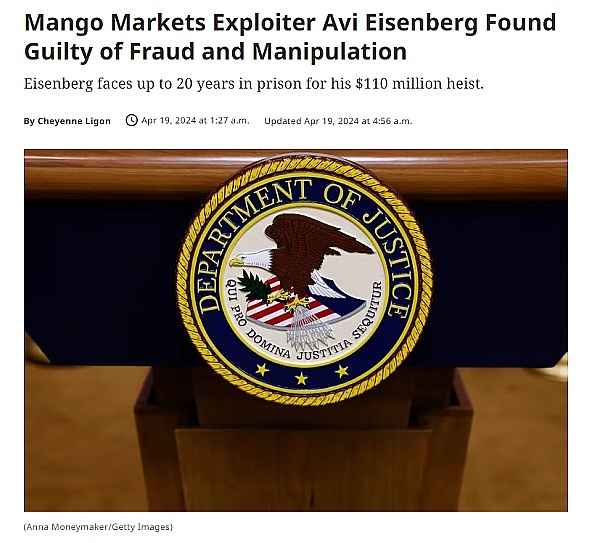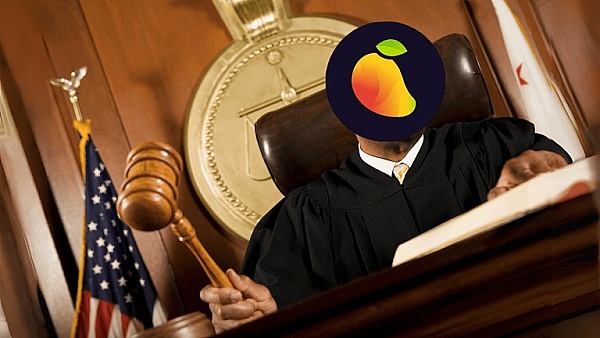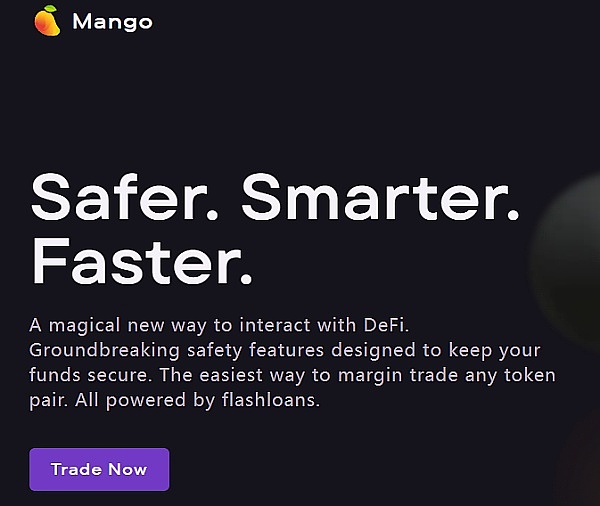Author: DeMan
In October 2022, Mango Markets was attacked by Avi Eisenberg and lost $110 million in crypto assets. On April 19, a jury in Manhattan, New York, found Mango Markets attacker Avi Eisenberg guilty of fraud and market manipulation, and New York District Court Judge Arun Subramanian will sentence him on July 29. The jury in Manhattan, New York ultimately found Eisenberg guilty of multiple charges and he is expected to face up to 20 years in prison.
This incident not only reveals the potential security risks of DeFi platforms, but also emphasizes the need for regulation of the crypto market. Although Mango Markets suffered this blow, it also demonstrated the ability of the crypto field to self-heal and evolve, and also reminded investors that while pursuing high returns, they cannot ignore the management of security risks.

Let’s review the incident.
Simple review of the Mango Markets theft: attackers manipulated oracle price data
In October 2022, Eisenberg took advantage of Mango Markets’ design loopholes and significantly raised the price of the platform’s token MNGO by manipulating the price data of the oracle (Oracles). He then used the artificially increased token value to borrow other assets equivalent to more than $100 million from the platform, ultimately causing the platform to be insolvent. This move not only demonstrated the flaws in the design of smart contracts, but also exposed the systemic risks in the DeFi ecosystem.
After the incident, Eisenberg was arrested by the FBI in Puerto Rico and extradited to New York to face trial. He faces charges including commodity fraud, commodity manipulation, and wire fraud, which together could result in a maximum sentence of 20 years in federal prison.

The trial in this case is not only a ruling on Eisenberg's personal behavior, but also a broader test of the adaptability of U.S. law to the definition of cryptocurrency fraud or market manipulation in the DeFi field. Eisenberg's defense team described his behavior as a legitimate market strategy, namely, to execute transactions by exploiting loopholes allowed by the protocol, a view that directly challenges the traditional legal definition of fraud and manipulation.
Is the saying "Code is Law" established? The industry also needs to start a serious discussion
The Mango Markets manipulation incident not only highlights the fragility of the market, but also challenges the modern interpretation of "Code is Law". The trial focused on opening up the debate on "Code is Law", a view that blockchain technology and smart contracts should be part of the law. According to this principle, any behavior permitted by the code should be considered legal because all transaction participants have implicitly accepted the rules and logic inherent in the code.
The Mango Markets incident and the subsequent trial will set an important legal precedent for the DeFi field. The outcome of the trial will not only affect Eisenberg's fate, but may also determine how DeFi designers build future smart contracts to avoid similar manipulation while protecting user assets from the threat of such attacks.
In addition, this case may prompt the legal community to consider the relationship between smart contracts and traditional laws more deeply, especially in how to deal with and interpret legal and ethical issues in smart contracts. For the DeFi industry, this will be a critical moment to test its maturity and sustainability, and a signal that regulators may intervene.
In short, the Mango Markets case is not only a financial loss, but also a comprehensive test of the security and legal definitions of the DeFi field. This incident reflects the new challenges brought by new technologies and the shortcomings of the existing legal system in dealing with the rapidly developing blockchain technology.
As the principle of "code is law" continues to be controversial, the industry expects clearer legal guidance and regulations to ensure the healthy development of blockchain technology.
Although assets were damaged, Mango Markets' handling of the incident is still worthy of recognition
Although the hacking incident once damaged Mango Markets' reputation, the transparency and determination to deal with the problem during the response process also rebuilt the trust of users to a certain extent. The platform took quick action and worked with the community and security experts to not only patch the security vulnerabilities, but also improve the risk management and monitoring systems to prevent similar incidents from happening again in the future.
Mango Markets is still expected to continue to develop and expand in the DeFi field by leveraging its low cost and high efficiency advantages on the Solana platform. Although the security incident was a serious setback, it was also a profound learning opportunity, providing valuable experience and lessons for Mango Markets' future operations, especially in strengthening user asset protection and platform security.

Despite the increasingly fierce competition in the DeFi market, Mango Markets is expected to continue to play an important role in the future of cryptocurrency finance with its innovative products, improved security measures and continuous technical optimization. For investors and users, choosing a platform that can adapt to the rapidly changing market and recover quickly from the crisis will be the key to their navigation in the vast crypto market.
In short, although the hacking incident experienced by Mango Markets was a blow to it, the way it handled the crisis also demonstrated its potential as a mature DeFi platform. As the security and regulatory requirements for DeFi continue to increase, Mango Markets' future path is full of challenges but also opportunities, indicating its positive possibilities in promoting the widespread application of cryptocurrency and blockchain technology.
 Alex
Alex
 Alex
Alex Bitcoinist
Bitcoinist cryptopotato
cryptopotato Nell
Nell
 Others
Others Coindesk
Coindesk Coindesk
Coindesk Tristan
Tristan Bitcoinist
Bitcoinist